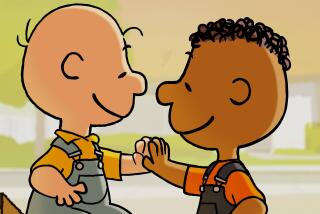Oh, good grief
- Share via
THERE’S something deeply comforting about the comic strip “Peanuts.” Charlie Brown and his friends are always a reliably affable blast from the past. But the strip’s full power has been obscured in recent years by the endless specials, the pruned-down collections and the carefully selected classic “Peanuts” strips that are running in more than 2,400 newspapers around the world. So it’s a treat to find that Charles M. Schulz’s work, which is slowly being reprinted in its entirety in a series of hip, beautifully researched books, is so deeply nuanced, even raw, and extremely funny.
Charlie Brown is a fairly accomplished diplomat, a guy who has friends, enough wherewithal to run a baseball team, and a real dose of intelligence -- and he’s still a loser. He hates himself for not having the nerve to speak to the little red-haired girl, then does a double take: “Well, that isn’t exactly true ... I hate myself for a lot of other reasons, too.” “Peanuts” is rife with that sort of gentle American existential angst. Snoopy lies awake at night thinking, “To lie awake at night and think about life’s problems is terrible.... But to lie awake and think about pizza is intolerable.” Meanwhile, Linus wonders how he’ll ever develop character if he keeps getting everything he wants for Christmas.
The latest installment in the series from Fantagraphics Books reproduces the strips of 1963-64, the years when “Peanuts” hits its stride. Peppermint Patty and Woodstock have yet to arrive, but Schulz has perfected the one-two-three-Bang! timing of his jokes, and the cuteness of the earlier work has given way to something with more gravitas that doesn’t deny the darkness in the world. Among the first of the “Happiness is” panels is “Happiness is loving your enemies,” showing Snoopy surrounded by adoring rabbits, which the Little Curly-Haired Girl wants him to hunt.
“Peanuts” also has mild Christian overtones that have been largely forgotten: Linus quotes scripture, and Charlie Brown calls Dial-A-Prayer to stop the rain falling on their ballgame. The strip also has its share of violence: Lucy’s idea of stopping a boy from crying is to hit him, and Snoopy perches atop his doghouse with a machine gun.
“Peanuts” has a lot to say about society, too. When Sally is asked whether she’s upset that her friend Linus is going to miss out on Halloween because he’s waiting for the Great Pumpkin, she replies: “It doesn’t bother me because it doesn’t affect me.” When Charlie Brown protests, Sally says: “Horrors! What do you want me to do, get involved?!” The strip also is occasionally mean. To get revenge against his sister Lucy, Linus builds a snowman likeness of her. “You’re going to get great satisfaction out of building a snow man that looks like me just so you can stand here and kick it!” says Lucy. Linus replies: “On the contrary! That would be crude.... I’m just going to stand here and watch it slowly melt away!”
But “Peanuts” always stops short of direct social or political commentary. Rachel Carson, author of “Silent Spring,” is mentioned, but Schulz never refers to her stance on the environment. Nor is there any hint of President Kennedy’s assassination in late November 1963, although the strip, which Schulz drew daily, is numbly unfunny for about a week. The closest “Peanuts” comes to political anger is with the all-but-forgotten character 5, a boy whose father has renamed him with a number because he believes that soon all people will be reduced to numbers. (5’s sisters, 3 and 4, are the unnamed twins in the dance scenes of the first “Peanuts” Christmas special).
What these comic strips reveal is a sense of power and haplessness, of people who feel a bit lost with their new midcentury might and affluence, and Charlie Brown is the sensitive soul who’s the most hapless of them all. “Peanuts” has a deep and beautiful sadness. Yes, it’s a strip about a loser, but he’s a loser in a world that’s kind enough to let him almost thrive. *
More to Read
Sign up for our Book Club newsletter
Get the latest news, events and more from the Los Angeles Times Book Club, and help us get L.A. reading and talking.
You may occasionally receive promotional content from the Los Angeles Times.










